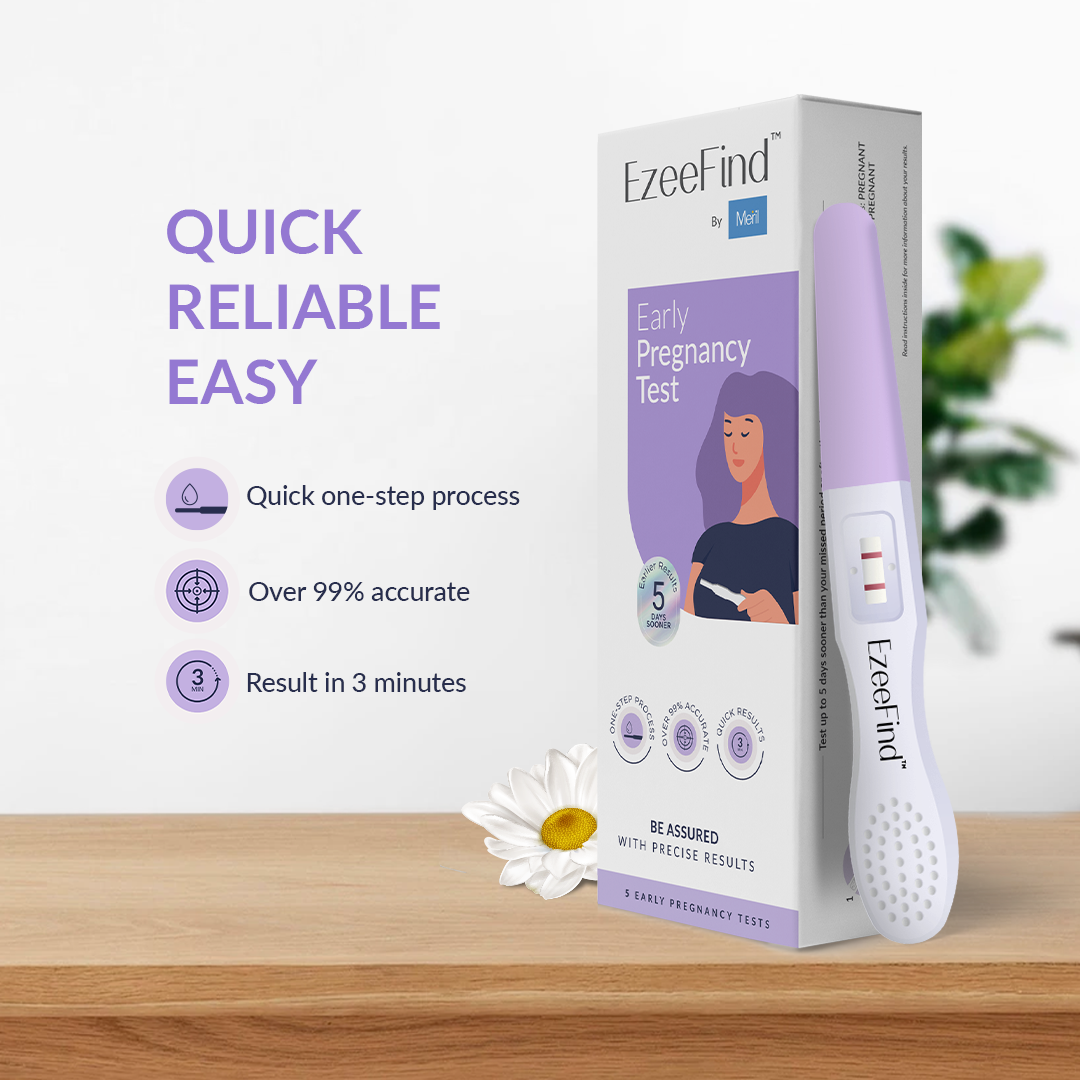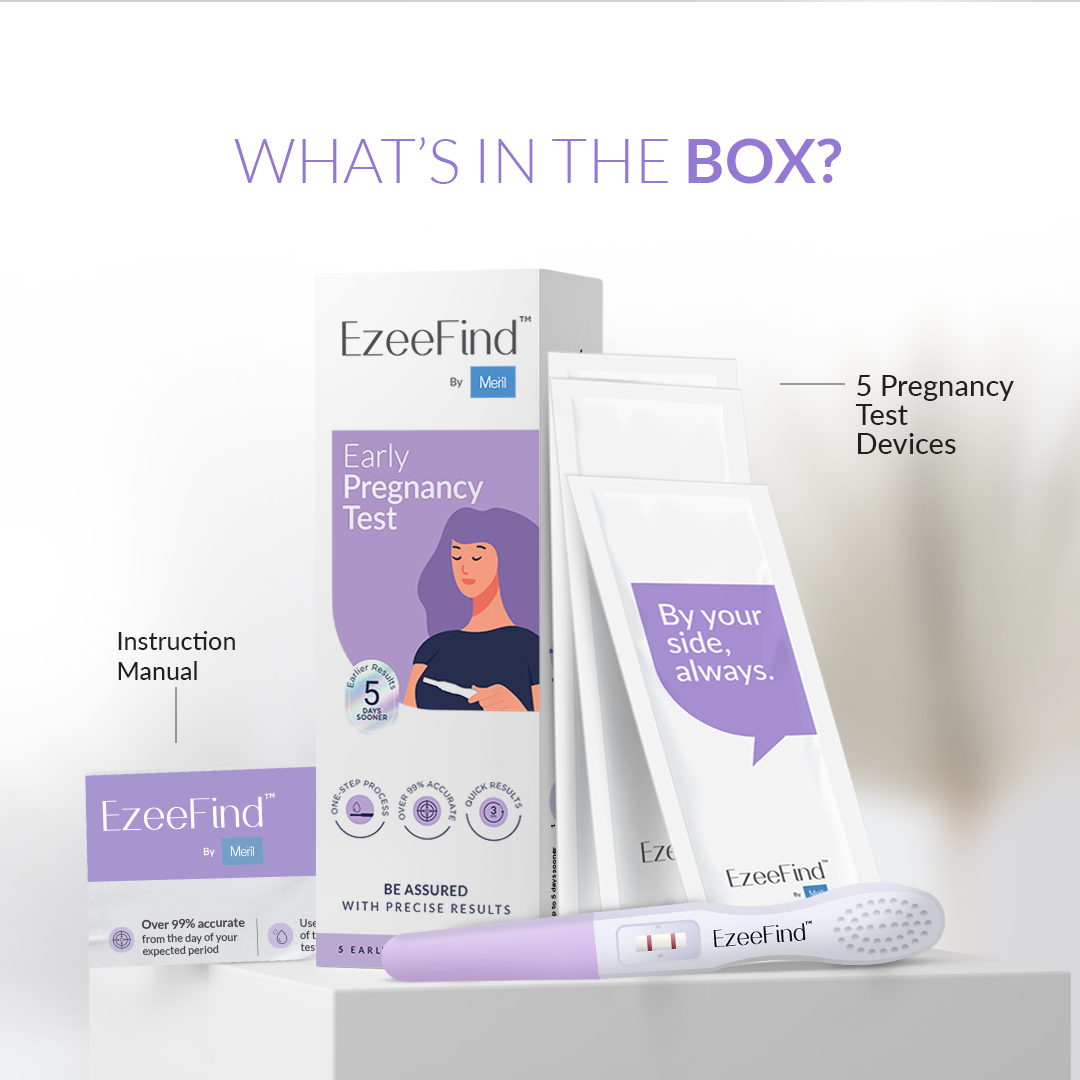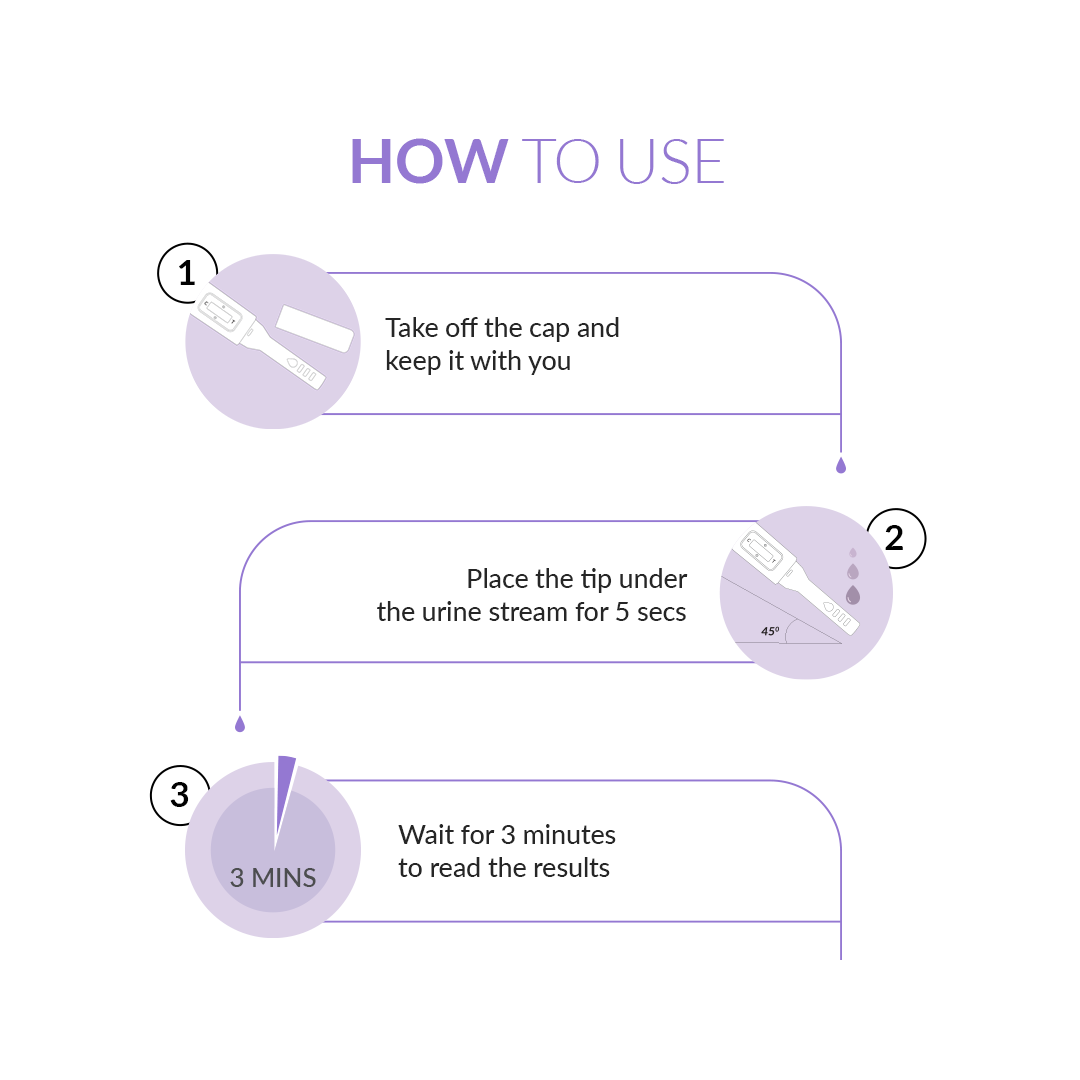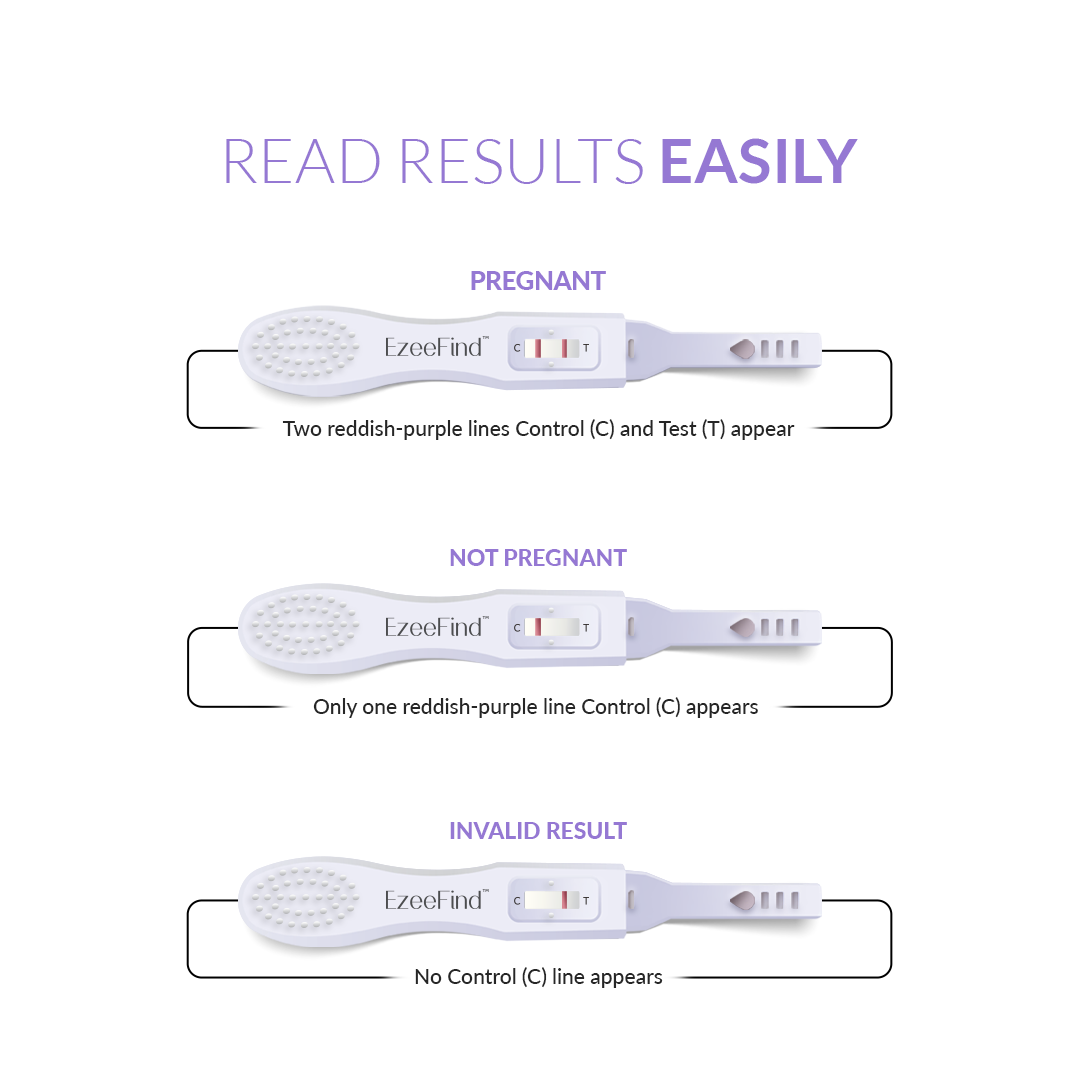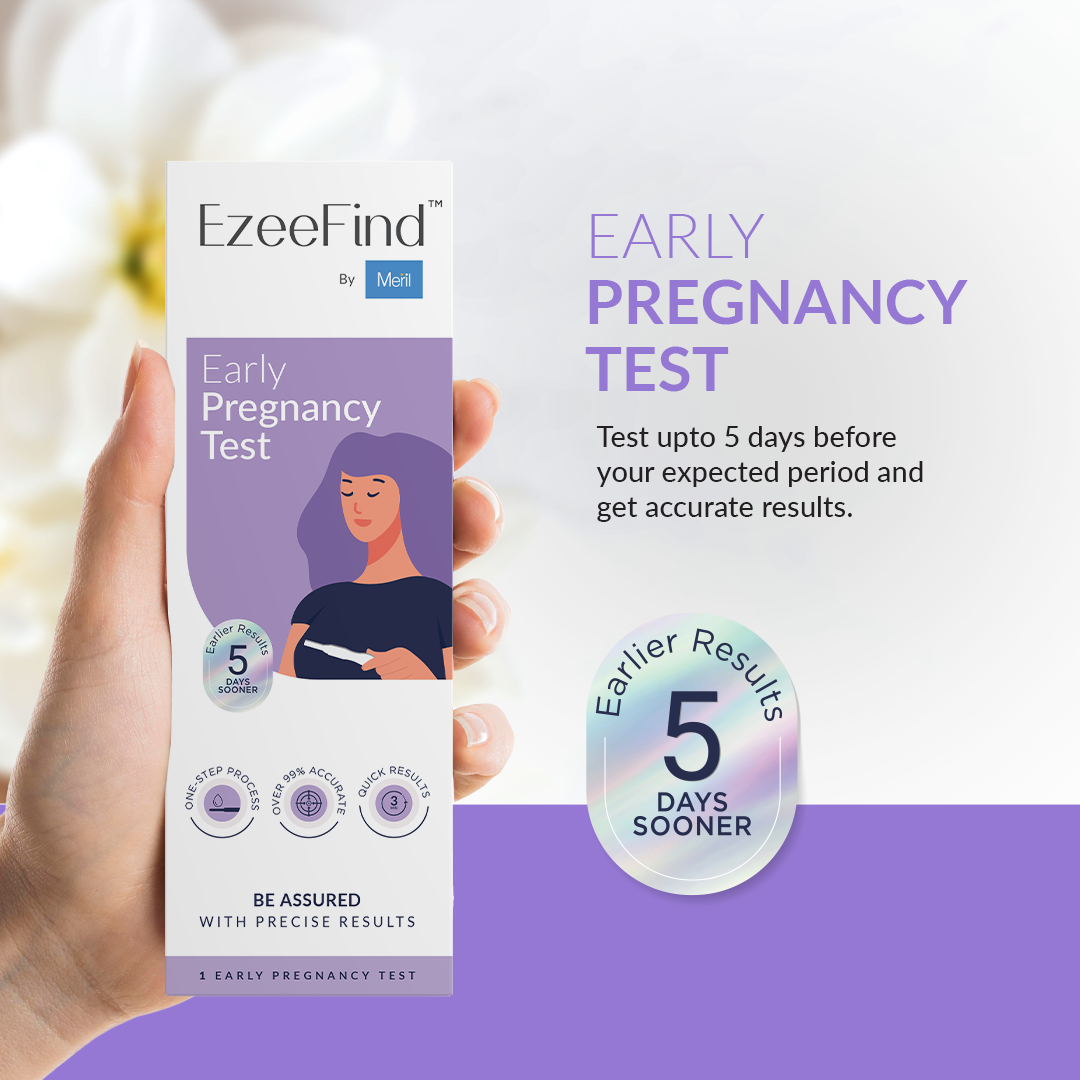

EzeeFind
Midstream Technology for Women | One Step Process | Over 99% accurate | Quick results
• EASY TO USE: The Accurate advanced pregnancy test kit is more practical, user-friendly, and hygienic than standard test kits since it can be used by placing it directly on the urine flow.
• ACCURATE: It is a simple pregnancy test that can be used at any time of day and provides accurate results in just three minutes.
• SOONER RESULTS: Can be used 5 days sooner than your missed period
• CONTENTS: The pack contains 3 Midstream test devices, dessicant & a pack insert.
• GRIP: Has a thumb grip, making it simple to hold.
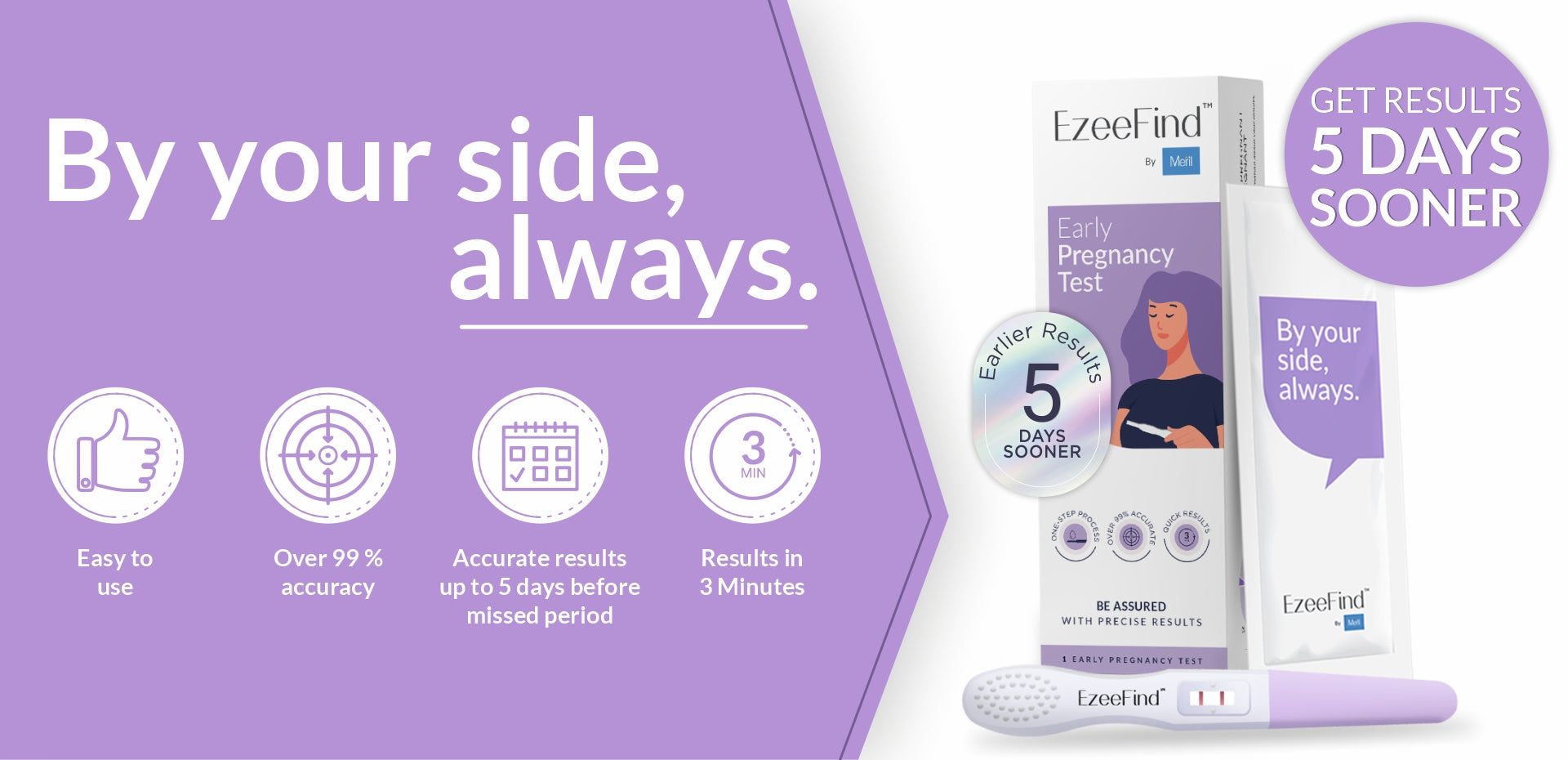
Experts Answer
Foods to avoid when trying for a baby
Some foods are not advised during pregnancy attempts because they may contain Listeria, a bacterium that can cause an illness that is detrimental to the infant. Any dairy product having unpasteurized milk (such as brie or feta cheese) can be a vehicle for listeria, as can store prepared salads. Raw foods (such as sushi, raw mussels, or raw shellfish) may also contain germs or parasites that are dangerous and should not be consumed. Women should also avoid mercury-rich seafood such as tuna and swordfish. Raw fruits and veggies should also be completely washed.
As we are trying for a baby should we increase our frequency of intercourse? Can too much intercourse damage the quality or quantity of the sperm?
Most doctors recommend that men with average sperm counts increase the frequency of intercourse during the woman's fertile window (just before and during ovulation) to increase the likelihood of fertilisation. Although an increase in intercourse can reduce sperm volume and total quantity, the amount appears to stay high enough to fertilise the egg, and the quality of the sperm may even improve when compared to extended periods between sperm generation.
How long does it take to get pregnant?
If you’re under 35 and in good health, it’s perfectly natural for it to take up to a year.It can take longer if you are older. Many couples may be trying to conceive at the wrong time. Because you can only conceive on the days before and the day of ovulation, it is important for intercourse to happen during this time. OvuFind Rapid Ovulation Tests are over 99% accurate at detecting your luteinizing hormone (LH) surge, which occurs 24-36 hours prior to ovulation. Once a couple starts trying to conceive, they expect and want pregnancy to happen quickly. A common factor is mistiming of intercourse. Many couples may be trying to conceive at the wrong time, because they don’t know when their most fertile days are. You are most likely to conceive if a couple has intercourse on the day of ovulation, or the day before (when you detect the LH surge), but you still have a chance of getting pregnant on the days leading up to ovulation. If you have been trying to get pregnant for longer than a year, it is recommended that you seek a medical opinion.
What can I do to get pregnant faster?
You can increase your chances of becoming pregnant if you time intercourse for the day of ovulation (when your body releases an egg) or the days before.
Ovulation tests detect the surge of a hormone called LH (luteinizing hormone), which peaks 24 – 36 hours prior to ovulation. Using an ovulation test as soon as you start trying to conceive will help you understand your menstrual cycle and quickly identify any cycle length irregularities. While an ovulation test may not be able to remove your stress completely, it can give you confidence that you are maximizing your chances of getting pregnant.
If after three monthly cycles you have not detected ovulation (peak fertility), we would advise you to see your doctor.
Can age affect my ability to get pregnant?
Age is a key factor in your likelihood of getting pregnant. A woman’s natural fertility will already start to decline in her late 20s due to the fact she has fewer eggs and the quality of the remaining eggs is likely to be lower than when she was younger. After 35 years of age, egg depletion is at a critical level and after 40 years the chances of achieving pregnancy are quite a bit lower. This is true not only for natural conception but also for assisted conception.
I’ve already had a child but am struggling to conceive again.
A number of factors can impede your ability to get pregnant even after having had a child in the past. The most common issue is your current age. If you had a child in the past and you are now over the age of 35, your ability to get pregnant may be decreased. You may also have developed a problem with your ability to ovulate consistently or a polyp or fibroid in the uterine cavity that may impact an embryo's ability to implant and thrive. Also, your male partner may have a sperm abnormality that has caused a decrease in his sperm count, motility or shape. If you are at all concerned, consult your healthcare professional.
I had a termination in the past; could it affect my ability to get pregnant now?
Usually, a pregnancy termination will not affect your ability to get pregnant in the future. On rare occasions, you may develop adhesions in the uterus that can cause issues with future fertility. If you are having normal monthly cycles, the chances of these adhesions affecting your fertility are low. Seeing your fertility specialist or gynecologist will be helpful in making sure your uterus has not been affected if you have been attempting pregnancy for one year, are under the age of 35 and have cycles between 23-35 days long.
Can certain sexual positions increase our chances of conceiving?
There is no optimal sexual position in terms of increasing chance of conception. The sexual position used should be one that provides the greatest comfort and enjoyment for both partners.
Why is folic acid recommended when trying for a baby?
Folic acid is a B nutrient that helps the body create fresh cells. When taken previous to and during pregnancy, has been shown to help avoid neural tube defects such as spina bifida in the infant. The Centers for Disease Control (CDC) recommends starting 400 g of folic acid 1 month before fertilisation and continuing it throughout the pregnancy. If a woman has previously had a child with a neural tube defect, she should consult her doctor about raising the preconception dosage.
We are planning to try for a baby, are there any dietary supplements apart from folic acid that can help me?
Prior to pregnancy, eating a balanced diet and keeping a healthy weight are critical. Any extra dietary requirements can be satisfied by consuming a daily prenatal vitamin containing the required vitamins and minerals. Furthermore, ensure that the prenatal vitamin includes DHA, a necessary fatty acid that is needed for brain and neurological development. Babies rely on DHA from their mothers. (since we do not produce it, and must get it from our foods or supplements). If the prenatal vitamin does not contain DHA, it should be taken as a distinct supplement to ensure the baby's brain health.
How many eggs do I have?
You've undoubtedly heard the phrase "a woman's biological clock," but what exactly does it mean and when does it start to matter? Women are born with 1 million possible eggs (in the shape of ovarian follicles), but that is the maximum number of eggs we will ever have. Unlike epidermis and blood cells, which renew, our bodies are unable to produce new egg cells. So our ovarian reserve is like a "bank" that doesn't accept deposits—and we're draining it month by month. A woman's ovary count may reach 1 million by adolescence; by 25, it has decreased. The drop then becomes steeper around the age of 35, until all eggs have been exhausted. (menopause).
Ways to treat female infertility?
Medicines - In the initial stage your doctor will suggest certain medicines to cure infertility.
Surgeries - In the case of endometrial tissue and damaged fallopian tubes, your doctor will suggest vital surgeries such as laparoscopy, hysteroscopy and tubal surgery.
IVF, or in-vitro fertilization, is one of the most common forms of ART in which reproduction occurs outside the human body, inside a modern laboratory where eggs and sperm combine to form an embryo. Later, this embryo is implanted into a woman's uterine lining so that it can attach and develop into a fetus while receiving nourishment from it.
Long story short, female infertility is curable if you take care of your health and consult a fertility expert at the right time.
When is the best time to try and conceive?
The most fertile days of a woman’s menstrual cycle are the days leading up to and the day of ovulation. OvuFind TM is a self test that will help you track your ovulation peak and discover the days when you are most likely to conceive through intercourse.
What are the possible causes of female infertility?
Ovulation disorders
PCOS
Endometriosis
Age
Hormonal disorder
Obesity
Poor lifestyle choices
Damaged/ blocked fallopian tubes
Unexplained infertility
We are planning to try for a baby, are there any dietary supplements that my partner should be taking?
When feasible, we always advise our patients to get their nutrition from meals rather than supplements. Although some studies have shown that supplementing with a mix of certain nutrients and anti-oxidants may improve men's sperm parameters, whether or not this improvement transfers into higher pregnancy rates (the final objective) is uncertain in the literature at this time. What is known is that lifestyle adjustments such as keeping a healthy weight, quitting smoking or using recreational drugs, and limiting alcohol consumption can improve sperm quality.
FAQ
What is Ezeefind Early Pregnancy Detection kit??
Ezeefind is a pregnancy test that detects the presence of hCG (Human Chronic Gonadotrophin) in urine. If Hcg detected in urine it is considered a positive sign of pregnancy. It reveals if the concentration of that hormone in the urine is equal to or above 10mIU/ml. The level of hormones increases as pregnancy progresses. The Ezeefind pregnancy test is 99% accurate provided the test is performed properly. It is absolutely safe to use. It’s a physical product and does not interfere with any bodily activity.
When can I see the results?
The Ezeefind TM Early Pregnancy Detection Kit displays results within 3 minutes. You can read results between 5-10 minutes. Do not read results after 10 minutes.
What does 1 Pink line mean?
If 1 Pink Line appears, it depicts a ‘Negative’ state – Pregnancy is not confirmed.
What do 2 Pink lines mean?
If 2 Pink Lines appear, it depicts a ‘Positive’ state – Pregnancy is confirmed.
When can I take this test?
The user can test for pregnancy on the first day of missing their period or any other day after that. However, if anybody does the test before the expected date of the periods, the result may not be 100% correct/precise.
What is the apt time to take the test?
The test should ideally be performed during the first urine period of the morning. This is important as the first cycle of urine in the morning includes more quantity of "HCG". HCG is a pregnancy hormone found in an expectant woman's urine that aids in the detection of pregnancy. The test can also be performed at any other time of day with fresh urine. This urine, however, must be retained in the urinary tract for approximately 4-5 hours. This increases the quantity of HCG in the urine.
When should I start testing?
The user can test for pregnancy on the first day of missing their period or any other day after that. However, if anybody does the test before the expected date of the periods, the result may not be 100% correct/precise.
Should I drink plenty of liquids before the test?
There needs to be a good amount of urine in the bladder for the test to work effectively. Drinking water can be helpful. It is essential that urine is stored in the urinary bladder for about 4-5 hours in order to get precise results.
Do I need to keep a diet before the test?
There is no need to keep a diet before taking the test.
What does one dark line and one pink line signify?
This indicates that there is insufficient HCG hormones present in the urine. You are advised to repeat the test again the next morning.
What could affect my results?
Some prescribed drugs, such as progesterone derivatives medicine, androgenic hormones medicine, ovulation inducing drugs and synthetic steroid growth hormone may affect the results. If you are going for any therapy for infertility, please consult your doctor for appropriate time to begin the testing. Medication containing hCG (Human Chronic Gonodotrophin) or LH (Luteinizing Hormone) may affect the test and should not be taken while doing the test. If you are medically diagnosed with a fertility problem, you should consult a healthcare professional before using the test.
I have irregular periods. Whats the best time to test?
This makes it harder to predict when to test but we’ve got you covered. Count 14 days from the last time you had intercourse and then take the test. If the test turns out negative and you think you might be pregnant, test again in a couple of days.
When is the best time to try and conceive?
The most fertile days of a woman’s menstrual cycle are the days leading up to and the day of ovulation. OvuFind is a self test that will help you track your ovulation peak and discover the days when you are most likely to conceive through intercourse.
The line in the test area is extremely faint. What should I do?
If the line is really faint and you’re straining to see. It may be too early to test or your urine is watered down. To be sure, it is recommended to retest after three days.
My test was negative, but I skipped my period. What does this mean?
If you see a control line (C) but don’t see a test couldn’t detect hCG in your urine yet. It could be either mean you’re not pregnant or it’s too early to test. You could test again in a couple of days to be sure. If its still negative, we recommend you visit your doctor.
Top things to help you get Pregnant
1. Stop contraception
When you cease using some means of contraception, such as the male and female condom, the cap, diaphragm, and natural family planning, your menstrual periods and ovulation will not be impacted. It may take some time for your menstrual periods to revert to normal after discontinuing other means of contraception, such as the combined contraceptive tablet and contraceptive injections. Although there is no reason why you can't start attempting for a baby right away, some women prefer to wait a few months to re-establish their normal cycles, start taking folic acid, and completely prepare their body.
2. Have sex at the right time
Did you realise that one in every two couples may be attempting to conceive at the incorrect time1? A woman can only become pregnant on a few days each month; having intercourse on the day of ovulation (when your body releases an egg) or in the days preceding ovulation will increase your odds of becoming pregnant.
You've undoubtedly heard that the typical cycle lasts 28 days and that ovulation happens on day 14. Both of these figures are simply averages based on published statistics. In fact, most women's periods do not correspond to this "average." Tracking with an ovulation test will allow you to determine your individual period duration and date of ovulation rather than relying on an estimate.
3. Take folic acid
Taking a folic acid supplement can help your infant avoid neural tube abnormalities like spina bifida. In the United Kingdom, for example, the Government's Chief Medical Officer recommends that women planning to become pregnant, or who are already pregnant, take a folic acid supplement containing 400 micrograms of folic acid every day, ideally starting three months before you start trying to conceive and continuing throughout the first trimester of your pregnancy2. If you consume a nutritious diet, you will get some folic acid from foods like fortified morning cereals, legumes, leafy green veggies, and orange juice, but it is still essential to take vitamins because getting the needed folic acid quantity through diet alone is challenging.
4. Eat healthy foods
To give your infant the best possible start, it's a good idea to consume regular, balanced meals, plenty of fresh fruit and veggies, and limit processed and 'fast' food. Make certain that your food includes:
Whole grain bread, spaghetti, rice, and cereals are healthier than white bread, cakes, and pastries.
Fruits and veggies - aim for five servings per day, and remember that the more colourful the fruit or vegetable, the more nutritious it is.
Meat, seafood, eggs, legumes, and beans are all good sources of protein.
Milk and milk products are high in calcium, which is essential for bone growth.
Fat - Try to get your fat from veggie sources such as olive oil or oily seafood such as salmon.
5. Avoid certain foods
Raw eggs and raw or undercooked meat or shellfish
These may contain salmonella or other organisms which can cause food poisoning
Unpasteurized dairy products, liver or liver pâté and leftovers
These foods can contain Listeria, which can lead to miscarriage or stillbirth.
Liver/liver products
These contain high levels of vitamin A, which may be harmful for a developing baby so should be avoided.
Vitamin supplements not labelled "For Use in Pregnancy"
Vitamins and other supplements should only be used if it says on the container they are safe to use in pregnancy. This is because some vitamins, if taken at high levels, are very dangerous for the developing baby. It is important to take folic acid as mentioned earlier, so either buy this as a single supplement or buy a supplement designed specifically to be used in pregnancy.
Be careful with medication
Discuss any medication you're taking with your doctor and also, make sure you speak to your doctor before stopping any prescribed medication you are taking. Let the pharmacist know you're pregnant if you need any over-the-counter medicine. Even simple remedies like decongestant nasal sprays can contain ingredients that should not be used when pregnant.
Be aware of toxoplasmosis
Unwashed vegetables, undercooked meat and cat feces carry the risk of toxoplasmosis – which can cause miscarriages, stillbirth or damage to your baby. So always wash fruit and vegetables, only eat thoroughly cooked meat and wear gloves when you're gardening or emptying cat litter trays.
6.Stay fit and maintain a healthy body weight
Pregnancy places a lot of strain on your body, so getting in shape before you conceive will assist you afterward. If you are healthy before becoming pregnant, you will find it simpler to remain active while expecting. Exercise can make you feel better and have more vitality. It also lowers tension, which is beneficial when trying to conceive. Being a healthy body weight can help you get pregnant, so it's best to attempt to reach your ideal weight before trying to get pregnant. Your specialist will be able to advise you on a good weight for you.
7. Stop smoking, recreational drugs, alcohol
It's best to avoid smoking, recreational drugs and alcohol while you are trying to get pregnant and throughout your pregnancy.
If you smoke or take recreational drugs then giving up will improve your chances of having a healthy pregnancy and a healthy baby.
Drinking during pregnancy can damage your baby in the long run, and the more you consume, the higher the danger. To keep risks to your infant to a minimal while pregnant or contemplating a pregnancy, the safest strategy is to avoid drinking alcohol entirely. If your spouse smokes, drinks, or uses drugs, it is critical that they reduce (or, ideally, cease) using these substances while you are attempting to conceive. Apart from their negative impacts on you, cigarettes, recreational substances, and booze can all have a negative impact on sperm quality.
8. Optimize vaginal health
Use a sperm-friendly lubricant Vaginal soreness is more prevalent than most people realise. In a study comprising over 6,500 women from 11 countries, up to 18% of women aged 18-34 years stated having always or generally experienced vaginal dryness4. When attempting to conceive, this can be exacerbated by having a lot of baby-making intercourse. Some of the most popular lubricants can be detrimental to sperm, so use a sperm-friendly lube.
If you notice any unusual vaginal leakage, consult your doctor. Common vaginal infections, such as bacterial vaginosis or thrush, are readily managed and make it simpler to attempt for a baby.
9. Get your partner involved
Here are some ways to help him create healthy sperm stay fit and healthy Your partner should try to be as active as possible, reduce alcohol, stop smoking and eat a healthy diet.
Use sperm-friendly lubricant
Make sure any lubricant you use isn't 'spermicidal' or toxic to sperm. You can buy 'sperm-friendly' lubricants that are specially formulated.
Keep testes cool
Your partner should wear loose underwear and avoid hot baths. Consistent or prolonged 'heating' of the testes can reduce sperm quality.


